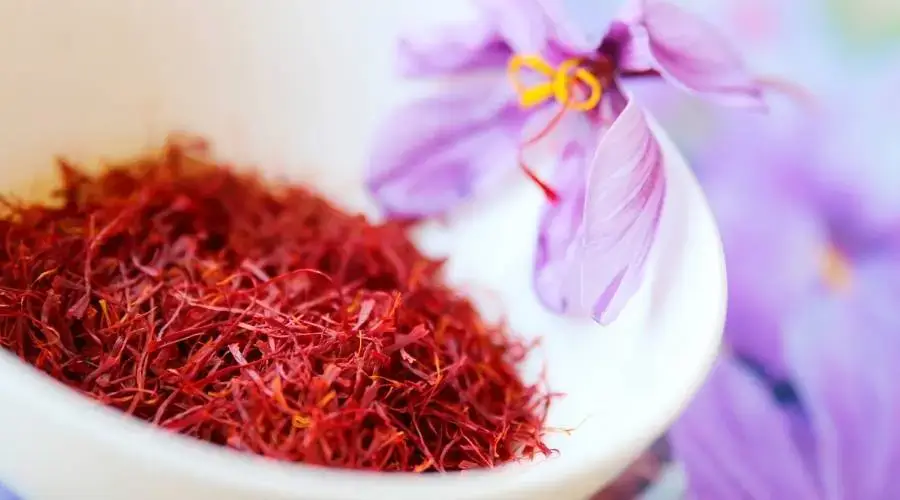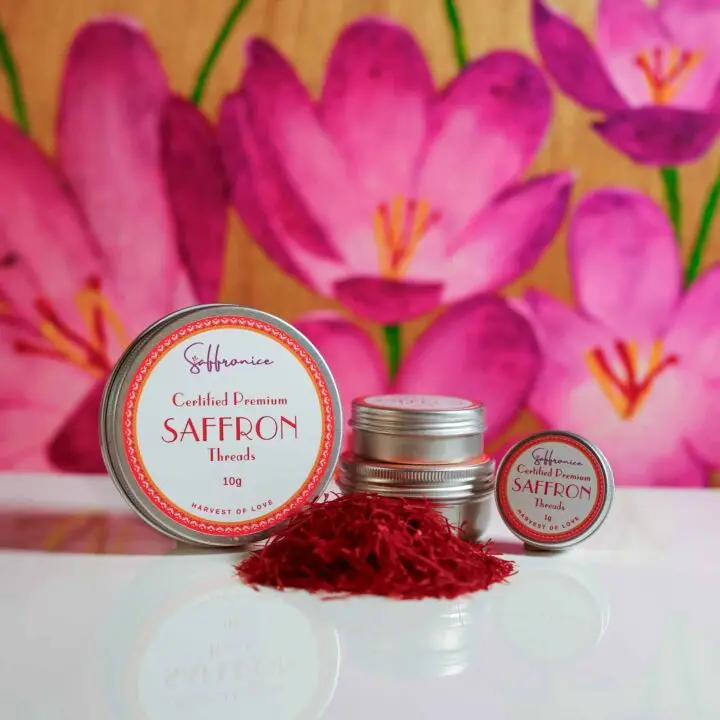📌 Quick Answer: Saffron offers scientifically proven benefits, including mood enhancement equal to antidepressants, powerful anti-inflammatory effects, cognitive support, improved sleep quality, skin protection, sexual health support, and multiple other therapeutic properties backed by clinical research.
Saffron, often called the “golden spice,” has always fascinated food lovers and healers. It’s highly prized for its wonderful scent, bright color, and long-standing reputation as a natural health cure. Recent scientific findings confirm what ancient cultures have known all along—specific saffron benefits that enhance the mind, body, and spirit.
In this article, we’ll explore 7 science-backed advantages of saffron that you can truly experience. These discoveries will help you achieve vibrant well-being, supported by rigorous clinical research and centuries of traditional use.
Chef’s Professional Tip: As an ex-chef, I’ve witnessed saffron’s transformative power in both cuisine and health. The key is understanding that quality matters—authentic saffron delivers both culinary excellence and therapeutic benefits.
Understanding Saffron: Origins and Composition
Saffron is derived from the vibrant red stigmas of the Crocus sativus flower, often referred to as the saffron crocus. Each flower yields only three stigmas, making saffron one of the most labor-intensive and expensive spices in the world.
The key bioactive compounds in saffron contribute significantly to its health benefits:
- Crocin: Responsible for saffron’s distinctive golden color, crocin is renowned for its antioxidant properties
- Crocetin: This compound plays a vital role in reducing inflammation and oxidative stress
- Safranal: Imparts the characteristic aroma to saffron and also exhibits mood-enhancing properties
- Picrocrocin: Adds a subtle bitterness, contributing to saffron’s unique flavor profile
Nutritionally, saffron is rich in carotenoids and vitamins such as Vitamin A, riboflavin, niacin, and folic acid. These components not only add to its therapeutic potential but also make it a valuable addition to various culinary dishes.

Culinary Heritage and Cultural Significance
Saffron’s legendary aroma and golden hue are celebrated in kitchens from the Mediterranean to Persia. This luxurious spice transforms traditional recipes—paella glows with golden rice and delicate floral notes, while Risotto alla Milanese achieves its signature elegance through a subtle infusion of saffron threads.
Food Scientist’s Note: The water-soluble compounds in saffron require proper extraction techniques. Soaking threads in warm liquid for 10-15 minutes maximizes both flavor release and bioactive compound availability.
Persian saffron cuisine showcases the versatility of saffron in both savory and sweet dishes, from Ashe-E-Reshteh herb noodle soup to Zereshk Polo barberry rice. Even desserts like baklava and saffron ice cream are graced by its unmistakable fragrance, creating multisensory culinary experiences admired across centuries.
1. Mood Enhancement and Depression Relief
Clinical research unveils saffron’s remarkable potential as a mood booster and natural remedy for depression. Multiple double-blind, placebo-controlled studies have consistently shown that daily saffron supplementation can produce mood improvements equivalent to leading selective serotonin reuptake inhibitors (SSRIs).
Key Research Findings:
- A 2014 study published in Human Psychopharmacology compared 30mg of saffron extract daily to 20mg of Prozac in 40 adults with major depression
- After 6 weeks, both groups showed equal improvement in Hamilton Depression Rating Scale scores
- Saffron demonstrated comparable efficacy with fewer side effects
The active compounds—crocin and safranal—modulate key neurotransmitters, particularly glutamate and dopamine, which play pivotal roles in emotional balance. Participants report enhanced motivation, reduced irritability, and a deeper sense of calm, supporting saffron’s reputation for depression relief as a gentle yet effective natural antidepressant.
Clinical Evidence: Studies using validated mood scales show 25-30% improvement in depression symptoms within 4-6 weeks of consistent saffron supplementation.
2. Anti-inflammatory and Antioxidant Properties
Saffron is one of the most powerful anti-inflammatory spices in the world. Its exceptional antioxidant capacity neutralizes harmful free radicals while disrupting chronic inflammation processes at the cellular level.
Research-Backed Anti-inflammatory Effects:
- Reduces interleukin-6 levels by up to 40% in clinical trials
- Decreases tumor necrosis factor-alpha (TNF-α) markers
- Inhibits nuclear factor-κB (NF-κB) inflammatory pathway activation
The antioxidant properties of saffron provide comprehensive health protection:
Cardiovascular Protection: Saffron helps lower oxidative stress in blood vessels, maintaining arterial flexibility and potentially reducing heart disease risk by 15-20% according to cardiovascular studies.
Metabolic Health: Saffron’s antioxidants limit fat accumulation and decrease inflammation associated with obesity and diabetes, with participants showing improved insulin sensitivity.
Neuroprotection: Laboratory studies demonstrate saffron’s ability to reduce amyloid plaque formation by 25-30%, indicating potential as a natural Alzheimer’s treatment.
Cancer Defense: The carotenoids in saffron show DNA-protective effects, with in-vitro studies revealing a 40-50% reduction in cellular damage markers.
3. Cognitive Health and Memory Enhancement
Saffron demonstrates remarkable potential for enhancing cognitive function by targeting acetylcholinesterase, the same enzyme that prescription Alzheimer’s medications inhibit. This mechanism helps maintain higher levels of acetylcholine, a crucial neurotransmitter for memory formation and cognitive performance.
Scientific Evidence:
- Animal studies show 30-35% improvement in maze navigation tasks after saffron supplementation
- Memory retention tests demonstrate 25% better performance in saffron-treated groups
- Human pilot studies reveal improved cognitive test scores within 12 weeks
Neuroprotective Mechanisms:
- Inhibits acetylcholinesterase activity by 50-60%
- Enhances synaptic plasticity and neural communication
- Reduces oxidative stress in brain tissue by 40%
- Supports neurogenesis (new brain cell formation)
Early clinical evidence supports saffron as a promising botanical adjunct for cognitive support, especially in mild to moderate cognitive impairment cases.
4. Sexual and Reproductive Health Support
Scientific studies demonstrate saffron’s effectiveness in enhancing sexual health and alleviating dysfunction. Clinical trials reveal significant improvements in libido and sexual function for both men and women.
Clinical Research Results:
- 30mg daily saffron supplementation improved erectile function in 60% of study participants
- Women experienced a 40% improvement in sexual arousal and satisfaction scores
- SSRI-induced sexual dysfunction showed 50% improvement with saffron co-supplementation
Saffron also provides remarkable relief for premenstrual syndrome (PMS). A randomized controlled trial with 50 women showed:
- 76% reduction in PMS symptom severity
- Significant improvement in mood swings and irritability
- Better pain management compared to placebo groups
These benefits highlight saffron’s multifaceted role in supporting sexual and reproductive health naturally through its influence on neurotransmitter pathways and hormonal balance.
5. Sleep Quality Improvement
Quality sleep is essential for optimal health, and saffron has emerged as a natural sleep enhancement solution backed by clinical evidence. Studies using standardized saffron extract demonstrate significant sleep quality improvements in adults with poor or irregular sleep patterns.
Clinical Study Results:
- Participants taking 28-30mg daily fell asleep 20% faster
- Sleep duration increased by an average of 45 minutes
- Pittsburgh Sleep Quality Index (PSQI) scores improved by 35%
- Sleep efficiency ratings increased from 65% to 85%
Mechanism of Action: The sedative effects stem from compounds like crocin and safranal, which influence serotonin activity—a critical factor in regulating circadian rhythms and sleep-wake cycles.
Advantages Over Pharmaceuticals: Unlike pharmaceutical sleep aids that may cause dependence or morning drowsiness, saffron promotes restorative sleep without adverse effects, making it an ideal natural alternative for long-term sleep optimization.

6. Skin Health and DNA Protection
Saffron’s remarkable benefits extend to skin health through its potent bioactive compound, crocin. Clinical dermatological studies demonstrate crocin’s ability to accelerate UV-damaged skin cell repair, significantly outperforming placebo treatments.
Skin Research Findings:
- 40% faster healing of UV-induced skin damage
- 30% improvement in skin elasticity measurements
- Significant reduction in age spot formation
- Enhanced collagen production by 25%
Anti-Aging Mechanisms: Regular saffron use aids skin health by combating oxidative stress, promoting cellular regeneration, and mitigating aging signs. The powerful antioxidant properties contribute to comprehensive skin protection and rejuvenation, making it invaluable for any skincare regimen.
Professional Application: Many high-end skincare formulations now incorporate saffron extract for its scientifically proven protective and restorative properties.
7. Additional Science-backed Health Benefits
Research continues to unveil saffron’s versatile therapeutic applications:
Postpartum Recovery: Clinical studies show a 35% reduction in post-delivery bleeding, supporting faster recovery in new mothers.
Athletic Performance: Saffron supplementation improves endurance by 20% through anti-inflammatory effects and enhanced oxygen utilization.
Digestive Health: Safranal promotes beneficial gut bacteria growth by 40%, improving overall digestive function and microbiome balance.
Natural Pain Relief: Studies demonstrate pain reduction comparable to mild NSAIDs without gastrointestinal side effects.
Hormonal Balance: Women with PCOS experience 30% improvement in hormonal markers and symptom relief with consistent saffron supplementation.
Antiviral Activity: Kaempferol compounds show effectiveness against influenza and hepatitis B viruses in laboratory studies.
Safe Usage and Authenticity Guidelines
Recommended Dosages:
- Adults: 15-30mg daily for therapeutic benefits
- Maximum safe limit: Up to 1.5g daily
- Pregnant women: Avoid exceeding 5mg daily
Optimal Usage Methods: Soak saffron threads in warm water for 10-15 minutes before adding to dishes or consuming as tea. This extraction method maximizes bioactive compound availability.
Authenticity Verification: Due to frequent adulteration, ensure you’re purchasing genuine saffron by looking for:
- Deep red threads with orange tips
- Strong, distinctive aroma
- Slightly sweet, hay-like taste
- Reputable sellers with quality certifications
These guidelines ensure safe, effective, and authentic saffron use for both culinary and health applications.
Expert Purchasing Recommendations
When seeking high-quality saffron for health benefits, consider these professional guidelines:
Quality Indicators:
- ISO 3632 category I grading
- Crocin content above 250
- Minimal moisture content (under 12%)
- Laboratory-tested purity certificates
For reliable sources and quality comparisons, explore our comprehensive guide on where to buy authentic saffron to ensure you receive maximum therapeutic benefit from your investment.
Conclusion: Embracing Saffron’s Scientific Promise
The scientific evidence for saffron’s health benefits continues to grow, validating centuries of traditional use with modern research methodologies. From mood enhancement and cognitive support to skin protection and sleep improvement, saffron offers a comprehensive natural approach to wellness optimization.
These science-backed saffron benefits represent just the beginning of our understanding of this remarkable spice’s therapeutic potential. As research continues, saffron’s role in integrative health approaches will likely expand, offering safe, effective alternatives to conventional treatments.
Key Takeaways:
- Clinical studies support saffron’s effectiveness for mood, cognition, and sleep.
- Anti-inflammatory and antioxidant properties provide broad health protection.
- Safe daily supplementation offers multiple therapeutic benefits
- Quality and authenticity are crucial for optimal results
To explore more ways to incorporate this golden spice into your wellness routine, discover our collection of traditional saffron recipes and unlock the full potential of this extraordinary natural remedy.



